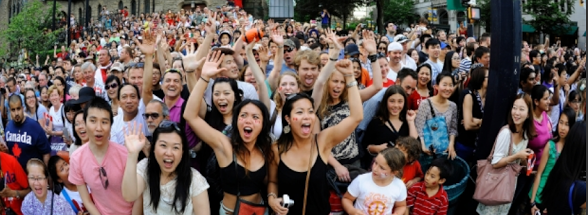On becoming the most “Asian” city outside of Asia

Vancouver Sun, “The most ‘Asian’ city outside Asia.”
What is the significance of Metro Vancouver becoming the most “Asian” city outside Asia? Forty-three per cent of Metro Vancouver residents have an Asian heritage, which is a much higher proportion than any other major city outside the continent of Asia.
Based on Statistic Canada reports, the number of those with Asian roots in Metro Vancouver will continue to grow at a faster rate than the non-Asian population.
Around the globe, the only major cities outside Asia that come close to Metro Vancouver for their portion of residents with Asian backgrounds are San Francisco (33 per cent Asian), London, England (21 per cent), Metro Toronto (35 per cent), Calgary (23 per cent) and Sydney, Australia.
Vancouver Sun, “Three million people snap up Canada’s 10-year visas.”
The global appetite for Canada’s new 10-year visas appears insatiable, especially in China.
More than three million people from countries with which Canada has long had travel restrictions have obtained the 10-year, multiple-entry visas since the program began in 2014.
With almost half the 10-year visas being handed out in Mainland China, where Prime Minister Justin Trudeau’s government this year opened seven new visa offices, the province of B.C., more than anywhere in Canada, has experienced a surge of visitors.
Immigration specialists say the 10-year visas are having multiple effects on Canada. They’ve markedly boosted tourism. And they’ve helped re-connect globally far-flung families for extended periods.
But they have also been vulnerable to abuse by rich trans-nationals with families in Canada who seek to avoid paying Canadian income taxes on their global income.
More than 1.4 million Mainland Chinese have gone through the vetting process to obtain Canada’s 10-year visa, which allows visits of up to six months at a time.
More than 716,000 people from India have also obtained multiple-entry visas, followed by 273,000 from Brazil and 140,000 from the Philippines.
The federal government says Mainland China visitors now spend $1 billion a year in Canada. Travel from that country has soared and China has become Canada’s third largest source of visitors after the U.S. and the U.K.
George Lee, a Burnaby immigration lawyer who was born in China, says Metro Vancouver hotels, retailers and restaurants are responding to the swelling stream of Chinese visitors by hiring more Mandarin-speaking employees and even making sure their staff “serve Coca-Cola warm,” the custom in China.
In addition, Lee said wealthy Mainland Chinese visitors are increasingly buying hotels, resorts and residential real estate in B.C., particularly in Metro Vancouver and on Vancouver Island.
“Vancouver has become a global village,” Lee said. “When we encounter a new trend … some, if not most, dislike it. They feel challenged and intimidated. But eventually people will get used to it.”
Vancouver Sun, “Is China bursting Vancouver’s housing bubble?”
The author of Millionaire Migrants was one the first to provide evidence that the foreign real-estate dreams of China’s wealthy have arguably had more impact than anything on Metro Vancouver’s housing unaffordability.
UBC geographer David Ley, along with SFU’s Wu Qiyan, told me early this year the city’s real-estate bubble would be punctured when leaders of the People’s Republic of China further restrict money leaving their country.
Now strong signs are appearing that Metro Vancouver’s real-estate balloon has indeed been pricked by China’s heightened capital controls.
Demand for multi-million dollar dwellings in Metro Vancouver is falling. “All the high-end stuff is sluggish,” says Vancouver realtor-analyst Steve Saretsky.
Sales volumes and prices on detached houses are especially dropping on the west side of Vancouver, in Richmond and in West Vancouver, where Mainland Chinese buyers had been active buying and building mansions.
Real Estate Association of Greater Vancouver figures show the median price of a detached home is down more than $500,000 since February, to $1.7 million.
(The declining demand for detached homes counters a run on small condos in Metro Vancouver. Saretsky believes condo purchases are not as tied to Mainland Chinese investors, while others nevertheless cite high Asian pre-sales.)
Veteran Canadian real-estate data analyst Stephen Punwasi also has little doubt “Chinese capital is having a tougher time getting out of China” since leaders introduced tighter controls in January.
“Vancouver locals selling $3 million bungalows are going to have trouble finding an alternative to foreign urban land buyers, so prices need to be slashed,” Punwasi said.
The co-founder of Better Dwelling, which specializes in housing data, said the volume of “hot money” leaving China in August has plummeted almost 40 per cent compared to August last year, to roughly $46 billion US. This is the kind of cash that typically goes into foreign real estate.
Vancouver Sun, “Almost 7 in 10 Metro residents will be non-white in two decades.”
Canada is experiencing the fastest rate of ethnic change of any country in the Western world, say international demographers.
Almost seven of 10 Metro Vancouver residents will be visible minorities, or non-whites, in less than two decades, says Eric Kaufmann, a professor at University of London, Birkbeck, citing Statistics Canada projections.
In addition, Kaufmann said another Statistics Canada report develops projections that he believes suggest Canada as a whole, based on current immigration patterns, will be almost 80 per cent non-white in less than a century.
